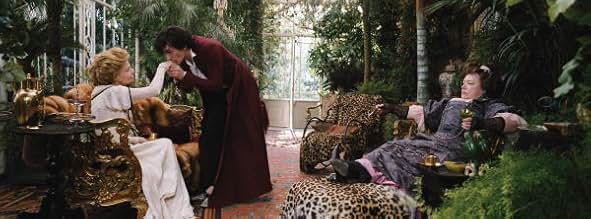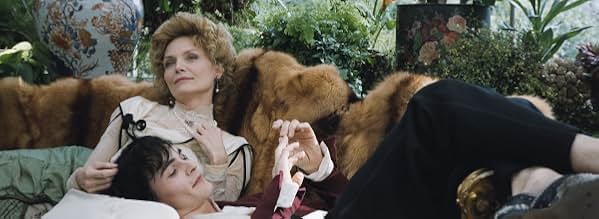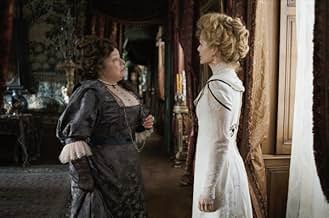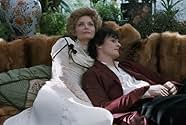O filho de uma cortesã entra em um mundo de fantasia depois de ser forçado a terminar seu relacionamento com a mulher mais velha que o educou nos caminhos do amor.O filho de uma cortesã entra em um mundo de fantasia depois de ser forçado a terminar seu relacionamento com a mulher mais velha que o educou nos caminhos do amor.O filho de uma cortesã entra em um mundo de fantasia depois de ser forçado a terminar seu relacionamento com a mulher mais velha que o educou nos caminhos do amor.
- Direção
- Roteiristas
- Artistas
- Prêmios
- 3 vitórias e 2 indicações no total
- Direção
- Roteiristas
- Elenco e equipe completos
- Produção, bilheteria e muito mais no IMDbPro
Avaliações em destaque
Kathy Bates is wonderful as Madame Peloux, a former competitor of Lea's—a woman who, if you squint hard (and catch the "portrait" of a younger Peloux) you can imagine having a gamine charm years before. Bates' acting moves effortlessly from laughing delightedly at smutty gossip to quickly assuming the pouting self-righteous expression of a disapproving mama as she discusses her son. From former courtesan to bourgeois matron in the blink of an eye. Bates carries this quick switch act off several times in the movie, and it's a pleasure to watch her skill at these rapid changes. The sets and costumes of Mme. Peloux, heavy 2nd Empire furnishings, stiff wired dressed with bustles, are beautifully contrasted with Lea's lighter look—slender, graceful, light. The clothes each character wears, and the styles of their respective homes, gives some subtext to the story. Mme. Peloux, a bit older than Lea, had her taste formed in an era of overdone stuffy pretentiousness, while Lea, a bit younger, has embraced the airy beauty of Art Nouveau.
The stultifying life of aging and former courtesans is well-depicted—unwelcome in respectable society they have to fall back on each other's company. Former competitors, they still can't help sniping at one another. Lea, as one of the youngest of the group, moves like a sylph among the faded charms of her cohort. One amazing scene: Among a bower of faded courtesans, one of them, a busty brassy red-head, cuddles and squeals like a teenager as she introduces her lover, a young man who's the son of one this woman's "official lovers." As she overwhelms the rather weedy young man with her caresses, the viewer can see Lea's discomfort—seeing the loud red-head and her boy lover seems like seeing a grotesque mockery of herself and Cheri.
Cheri, the title character, is played by Rupert Friend (Prince Albert in "The Young Victoria," and Mr. Wickham in the 2005 version of "Pride and Prejudice"). He's a young man who has only two responsibilities: marry, and manage the large amount of money his mother settles on him at his marriage. He's a young man without purpose, but finds love with Lea. What starts as a light-hearted affair turns into a relationship both Cheri and Lea need more than they realized. Lea and Cheri's affair ends—as does the wonderful era depicted in this gorgeous movie. The war ends Lea and Cheri's world. The 20th century starts with bleakness and hardness after the golden afternoon of La Belle Époque. We are indebted to Collette and Stephen Frears for showing us the loveliness, and even the artful decadence, of that time, and we are indebted to the talented cast for giving life to the "demi-monde" ("half-world") of that era.
Colette's two novels about Chéri (Friend) the son of wealthy courtesan Madame Peloux (Kathy Bates), are not just about an indolent but beautiful rich slacker; they also follow the good fortune of Lea de Lonval (Pfeiffer), an unusually beautiful and profitable courtesan who has shrewdly prepared herself for financial comfort but forget the cardinal rule of prostitutes: Don't fall in love.
After six years of lover's paradise, Chéri and Lea part as the takes an arranged bride. And that's all there is, folks, as the film moves from a robust ramble about the various courtesans to a dreary hour of Twilight-like longing between this old-fashioned Harold and Maude. Director Steven Frears, who has had a fair share of intriguing films and characters, just lets the camera make love to Pfeiffer and Friend without fleshing out the characters to let is know what is so lovable to be longing for so long. Writer Christopher Hampton with Dangerous Liaisons and Atonement on his resume can't seem to muster a memorable line or develop his characters from flat clichés into round characters.
I do concede that Kathy Bates delivering this line saved the film for the moment: "Don't you find that when the skin is a little less firm, it holds perfume so much better?" Said to Michelle Pfeiffer, these lines give Bates bite of the year honors and a brief respite from spare, meaningless dialogue.
"Chéri" is a strong film, just like Stephen Frears' previous effort. It is colourful, vibrant, emotional and captivating. The characters are well sculpted, especially Chéri and Lea. They are both captivating, making us care for them, longing to see them happy. Apart from being a love story, it also handles the issue of aging the fear of it in a sensitive and emotional manner. Michelle Pfeiffer's acting is excellent, her wide range of emotions show naturally throughout the film. I also applaud her for being unconventional in Hollywood, as she lets her age show in some films to mirror the theme of aging. In addition, the film's tone changes from light to serious, which also mirrors the issue of aging. I enjoyed watching "Chéri". It is a visual delight and a captivating love story.
What the director forgot in recreating so beautifully, so painfully all the paraphernalia necessary to reproduce that magnificent time in history was... the ideal of feminine beauty at the time.
We glaringly see it in the same old pictures (authentic) shown at the start of the movie, pictures of the great beauties then, like Lillie Langtry, Lia de Putti, la Bella Otero, etc. and it's obvious that those beauties where more on the side of Marilyn Monroe than Michelle Pfeiffer, who looks like a window display mannequin with no curves in the right places and no minimal waistline (Hourglass figure painfully obtained thanks to an oppressing corset, but there it was).
To give us total recall of that time our protagonist should have been somebody a bit fatter than Ms. Pfeiffer, since we readily forget all the changes the feminine figure has suffered just in the last 100 years; what was considered fashionable or desirable then was quite different from now, and a thin woman was totally undesirable.
The film is nice, in a very superficial way, since its main flaw is irreparable, because speaking English in this superbly French story, we get a jarring note, and it's this: All the "decadent" morality, social behavior, points of view about richly kept elegant cocottes by the upper class French men is something totally unknown to puritan Victorian English society. This utterly French "Menage a Trois" is totally lost in this English version of Paris life at the turn of the century.
The house where she lives, the street, the interior locations, the dresses, all that is perfectly fine (more than fine, exquisite), but THE ESENCE of Colette masterpiece is not there. Due to the strong visual appeal in interiors, color schemes, Art Nuveau architecture and Belle Epoque fashions, this is mainly eye candy for dress designers and interior decorators.
Você sabia?
- CuriosidadesWhen the project was in development during the 1990s, Jessica Lange planned to star as Léa de Lonval.
- Erros de gravaçãoIn the closing credits, 'thanks' are given to France's national railway, the Societe National Chemin de Fer, known as the "SNCF". However the credits have the letters out of sequence, calling it the "SCNF".
- Citações
Lea de Lonval: You came back here and you found an old woman. Yes, you found an old woman. Don't cry. Why are you crying? I'm so grateful to you. Were you really in love with me? Did you really think I was such a good person? If I had been a truly good person, I'd have made a man of you instead of thinking of nothing but your pleasure and my happiness. I wouldn't have kept you all to myself. Look at me. You're right. The qualities you lack, I expect it is my fault. But 30 years of easy living does make you very vulnerable. So no, I never did talk to you about the future. Forgive me. I loved you as if we were going to die the same day. I carried you in my heart for such a long time. I forgot you were going to have to carry your own burdens. A young wife. Perhaps even a child. And so you're going to suffer. You're going to miss me. And you're going to have to try to find enough wisdom and tolerance not to cause suffering to others. The thing is, now you've had a taste of youth. It's never satisfying, but you'll always want to go back for more. You must go. I love you. But it's too late. So get dressed. And go away now.
- Versões alternativasThere are five different versions. Runtimes are: "1h 40m(100 min), 1h 26m(86 min) (United States), 1h 32m(92 min) (United States), 1h 32m(92 min) (Argentina), 1h 40m(100 min) (Berlin International) (Germany)".
Principais escolhas
- How long is Chéri?Fornecido pela Alexa
Detalhes
Bilheteria
- Orçamento
- US$ 23.000.000 (estimativa)
- Faturamento bruto nos EUA e Canadá
- US$ 2.715.657
- Fim de semana de estreia nos EUA e Canadá
- US$ 405.701
- 28 de jun. de 2009
- Faturamento bruto mundial
- US$ 9.368.242
- Tempo de duração1 hora 40 minutos
- Cor
- Mixagem de som
- Proporção
- 2.35 : 1
Contribua para esta página


































